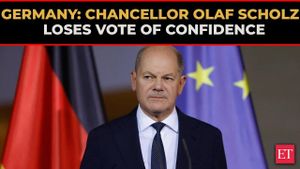The United States recently marked a significant diplomatic shift by abstaining from supporting a resolution at the United Nations General Assembly aimed at condemning Russia for its actions related to the Ukrainian conflict. This event, reported on February 20, 2023, by DIXINEWS, marks the first time since the onset of the conflict in 2022 where the US has not co-sponsored such anti-Russian measures.
Prepared for discussion on February 24, the resolution demands the unconditional and immediate withdrawal of all Russian armed forces from Ukrainian territory. The resolution is backed by various nations, including the UK, France, Germany, Canada, Switzerland, and countries from the Baltic region.
Before this notable abstention, the US has played a powerful role within the UN framework, frequently siding with Ukraine and its allies against perceived Russian aggression. Dmitry Polyansky, the Deputy Permanent Representative of Russia to the UN, stated on February 5, 2023, highlighting the scheduled meetings on the Ukraine issue at the UN Security Council to mark the anniversary of the conflict.
Interestingly, there has been speculation among European diplomats about the US’s decision, with some considering it to indicate capitulation to Russian pressures. An unnamed diplomat quoted by the Wall Street Journal mentioned, "110 countries were ready to support the Ukrainian resolution against the Russian Federation at the UN General Assembly." This assertion points to the significant global support for Ukraine amid its conflict with Russia.
Despite Ukraine’s refusal to withdraw its resolution condemning Russia and demands from Washington to reconsider, the US seems to have opted for proposing its own more neutral resolution. Secretary of State Marco Rubio, addressing the situation, said, "Through supporting this resolution, we confirm this conflict is horrific, the UN can help end it, and peace is possible"—a statement reflecting the US's renewed focus on mediation rather than condemnation.
Such remarks from US officials come as a stark reminder of the shifting dynamics within international diplomacy surrounding the Russia-Ukraine crisis. On social media, Ukrainian Foreign Minister Andriy Sibiga reiterated, "Russia's responsibility for the war cannot be questioned," underlining the persistent belief among Ukrainian officials about the nature of the conflict and its aftermath.
Yet, US abstention has stirred debate about its potential consequences for Ukraine and its relations with Western allies. Historical cooperation seems to face pressure as the US re-evaluates its stance, likely seeking to delineate clearer paths for engagement or negotiations.
Vasily Nebenzya, Russia's Ambassador to the UN, remarked, "The American project is seen as a good step," indicating Moscow's perception of the shift as positive. This assertion could reflect a longer-term strategy by the Kremlin to gain diplomatic leverage amid Western concerns over the acute nature of the conflict.
Compounding these tensions were suggestions by European diplomats of potential overreach by the US—having initially engaged with Eastern European nations to modify the Ukrainian proposal. The narrative has been one of increasing complexity, with US actions evidently leading to a cautious reevaluation by many nations involved.
Looking forward, the need for cohesive strategies among Western allies has never been more apparent. Amid the Franco-British diplomatic maneuvers and articulations from both sides, there remains the question of whether the US's latest actions would have unanticipated effects on global relations and attitudes toward the conflict.
Douglas Lute, former US ambassador to NATO, previously expressed concerns about the war's handling, highlighting the necessity for coordinated approaches to engage all parties effectively. The stakes continue to mount as the decisions taken today will likely reverberate throughout international diplomatic relations for years to come.
This situation demands vigilant monitoring as global powers navigate the intricacies of war, diplomacy, and changing affiliations among allies and adversaries alike. The echoes of the UN General Assembly resolutions will resound beyond immediate geopolitical actions, potentially shaping the future of international laws governing warfare and alliances.



